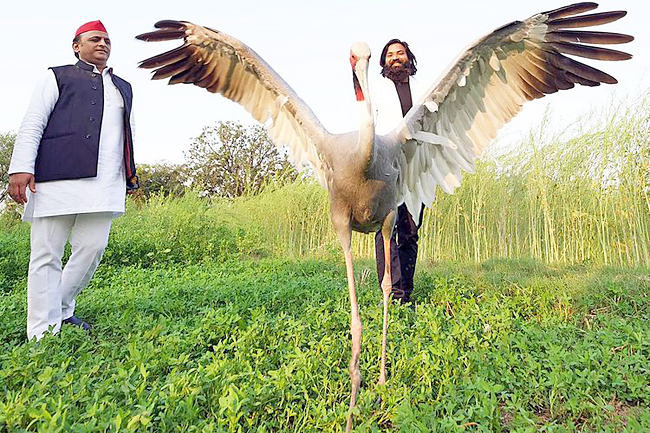GULF NEWS – Mohammed Arif, 30, works as a harvester operator in Mandka village of Amethi’s Jamo development block.
Arif had spotted a badly injured Sarus crane in a field in February last year.
“The bird was bleeding profusely in its right leg and I could see it was in a lot of pain. I picked it up and brought the bird home. I put some medicine on its leg and applied a plaster by fixing a bamboo stick and covering it with bandages. I have an outhouse, basically a shed with a tin roof where the bird was kept,” Arif said.
The bird took some time to recover.
“During the day, when I left for my work, the crane would hop around and mingle with other birds. But when I came home in the evening, the crane would come to me, cuddle me and we ate dinner together,” Arif said.
By April, the bird had fully recovered but it refused to leave his home.

“Life has not been the same since then. Now, wherever I go, the Sarus, whom everyone calls ‘Bachcha’, accompanies me to work. The bird takes a stroll when I am working and then we both have lunch together before returning home in the evening,” he added.
He said, “People stare at us and take our photographs. Some even make reels but now I enjoy the stares.”
During the winter season other Sarus cranes arrive in the area but Bachcha has not gone back with them.
Strangely, the crane’s love for Arif does not extend to his family members.
Arif’s wife Mehrunissa said, “Whenever in the absence of my husband, I have gone to feed him, I have been attacked. Neither I nor my two kids dare go near the Sarus.”
Wildlife experts have a different opinion of the incident and they advise caution.
Sarus cranes are regarded as the least social crane species. They can be very protective when nesting and are aggressive towards intruders.
Lucknow Divisional Forest Officer Ravi Singh said that ‘Sarus’ is a wild bird under the Wildlife Protection Act.
“We have a system to protect and nurture it, but one should be cautious. You cannot touch its wings or hold it near you. No human touch is allowed,” he said.
The Sarus must be allowed to live itself in the wild and it cannot be domesticated and allowed contact with humans. A diet of insects and fish must be given to the bird, he added.







